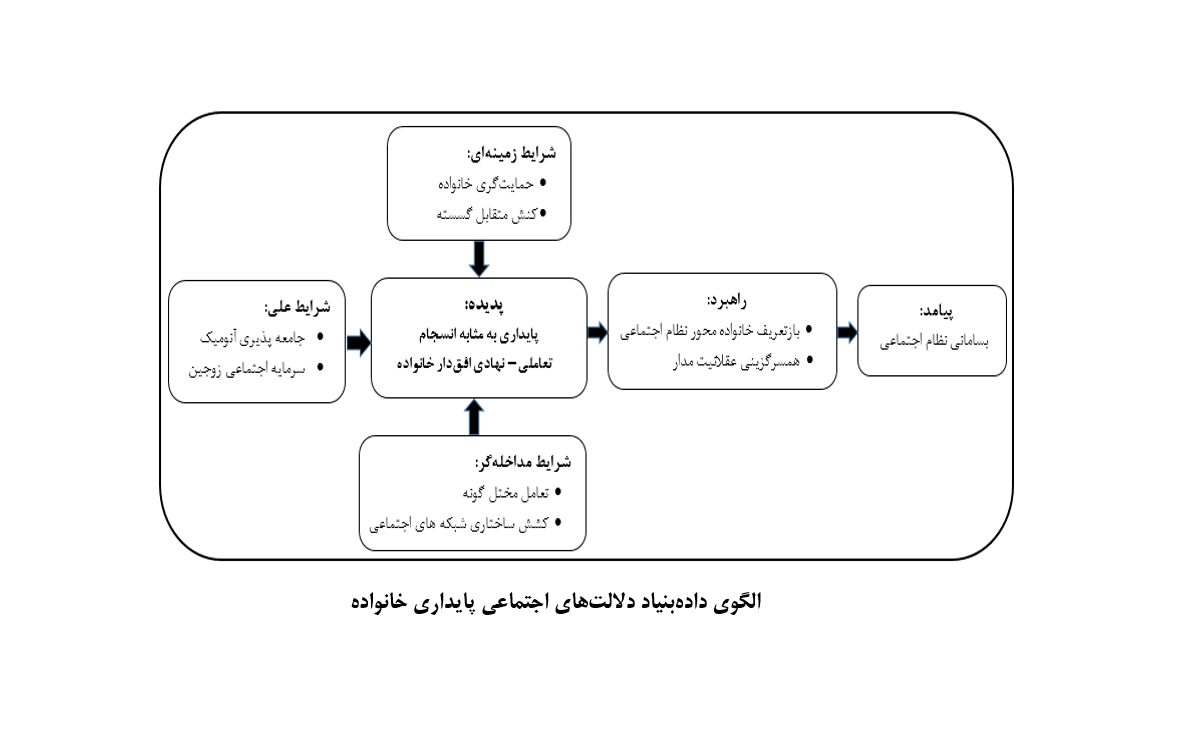Exploring the Social Implications of Family Sustainability: A Grounded Theory Study in Isfahan
Keywords:
Family sustainability, social implications, interactive–institutional cohesion, individual–social interconnectedness, grounded theoryAbstract
This study aimed to identify and conceptualize the social implications of family sustainability within the socio-cultural context of Isfahan and to develop a grounded theoretical model of this phenomenon. A qualitative research design was employed using the systematic grounded theory approach. The fieldwork was conducted in Isfahan with 14 family specialists and experts selected through purposive–theoretical sampling. Data were collected via semi-structured in-depth interviews and analyzed through open, axial, and selective coding. MAXQDA software (version 2022) supported data organization and visualization. Credibility was ensured by member checking and external expert auditing of codes and interpretations. Analysis revealed that family sustainability is a multidimensional construct conceptualized as “family sustainability as future-oriented interactive–institutional cohesion.” Causal conditions included anomic socialization and couples’ social capital, while contextual conditions comprised family support and fragmented interaction. Intervening conditions such as dysfunctional interaction patterns and the structural pull of social media influenced the dynamic process. Key strategies enhancing family sustainability involved redefining the social system around family-centered policies and promoting rational partner selection. The ultimate outcome was “social system coherence,” manifested in improved societal integration, security, and collective stability. The findings indicate that sustaining families extends beyond internal dynamics and requires addressing broader socio-cultural and communicative structures. Strengthening couples’ social capital, reorienting social policies toward family centrality, and managing the influence of social media are essential to achieving resilient and cohesive families that contribute to overall social order and well-being.
Downloads
References
Koenig HG, VanderWeele TJ, Peteet JR. Marital and Family Stability. 2024:254-80. doi: 10.1093/oso/9780190088859.003.0014.
Heidari H, Jahani Dolatabad E, Chitsaz MJ, Gholich M. Family Stability and Strength and the Factors Affecting It: Secondary Analysis of National Family Survey Data. Family and Research Quarterly. 2024;21(65):23-44.
Abbasi R, Pourjabali R, Zolfaghar K. Sociological Analysis and Interpretation of Factors and Barriers to Strengthening the Family Foundation (From the Perspective of Experts and Clients of the Zanjan City Family Court). Scientific-Research Quarterly of Applied Family Therapy. 2022;3(1):402-25. doi: 10.61838/kman.aftj.3.1.20.
Baghi M, Abbasi-Shavazi MJ. Household Dynamics in Iran: A Study of Four Decades of Changes in Family and Household Structure. Iranian Demography Association Journal. 2020;15(30):203-30.
Afsharkohan J, Rezaeian M. Intergenerational Comparison of the Relationship between Value System and Attitude towards Family Stability. Sociology of Social Institutions. 2018;5(12):293-326.
Emami P, Hashemianfar SA, Haghighatian M. Explaining the Relationship between Modernity and Familism in Isfahan City. Sociology of Social Institutions. 2018;5(11):227-51.
Kazemipour S. Family Transformations in Contemporary Iran with an Emphasis on Marriage and Divorce. Scientific Quarterly of "Research on Deviations and Social Issues". 2022;4:95-126.
Chitsaz MJ. The Iranian Family and Socio-Cultural Transformations: A Generational Analysis. Bi-quarterly Journal of Iranian Social Issues. 2023;14(1):89-112. doi: 10.61186/jspi.14.1.89.
Rasouli E. Youth's Attitude Towards White Marriage (Ezdevaj-e Sefid). Afaq-e Olum-e Ensani Monthly. 2021;5(15):51-70.
Yazdani F, Shafieabadi A, Heidari H. Predicting Marital Stability Based on Mate Selection Criteria, Communication Skills, and Family Resilience. Journal of Islamic Studies in the Field of Health. 2020;4(1):69-78.
Wang X, Li Q, Chen Z, Fang X. Stress Perception and Marital Instability Across the Family Life Cycle: An Actor‐Partner Perspective. Family Process. 2025;64(1). doi: 10.1111/famp.70018.
Akanle O, Nwaobiala UR. Changing but Fragile: Female Breadwinning and Family Stability in Nigeria. Journal of Asian and African Studies. 2019;55(3):398-411. doi: 10.1177/0021909619880283.
Khadivi S, Noughani M, Mazloum Khorasani M. Women's Employment and Family Stability: Presenting a New Approach to Conflicts in Previous Research. Women's Research Journal, Institute for Humanities and Cultural Studies. 2022;13(3):45-73.
Mehrabi M. Explaining the Role of Gender Inequality in Family Stability (Case Study: Women in Bandar Abbas City). Scientific-Research Quarterly of Islamic Lifestyle. 2023;7(2):76-84.
Pourjabali R, Azimi L, Ahmadpour Parvizian J. Studying the Relationship between Development Idealism and Changes in Family Structure (Case Study: Tabriz City). Scientific-Cultural-Educational Journal of Women and Family. 2022;17(60):251-73.
Yoo J. Gender role attitude, communication quality, and marital satisfaction among Korean adults. Journal of Family Studies. 2020;28(3):1-18. doi: 10.1080/13229400.2020.1791230.
Hasheminejad S, Eyvazi MR, Hājīāni E, Goljāni Amīzekhīz I. Future Scenarios of the Family in Iran. Quarterly Journal of the Women and Family Social Cultural Council. 2018;21(81):47-82.
Hashemizadeh Fs, Atashpour H, Farhadi H. Comparison of the Effectiveness of Paradox TimeTable Cure and Acceptance and Commitment Therapy Matrix on Family Adaptability and Mental Well-Being in Women with Marital Conflicts. Shenakht. 2025;11(6):106. doi: 10.32598/shenakht.11.6.106.
Maarefvand A, Shafiabady A. Effectiveness of Shafie-Abadi's Multidimensional Model Training on Enhancing Occupational Well-being and Quality of Work Life among Teachers in Qom City. International Journal of Education and Cognitive Sciences. 2024;4(4):21-30. doi: 10.61838/kman.ijecs.4.4.3.
Dehdast K, Ghobadi S. Explaining the Indicators of Disruption in the Iranian Family Affected by the Modernization Process: A Qualitative Meta-Analysis. Quarterly Journal of Counseling Culture and Psychotherapy. 2020;11(43):121-58.
Mahmoudzadeh A, Yousefi Z, Golparvar M. Designing a Family Stability Model Based on Islamic Teachings. Islamic Research Journal on Women and Family. 2019;7(17):33-74.
Youri Z, Yaghouti E. Principles Governing Family Health and Stability from the Perspective of Jurisprudence and Positive Law. Quarterly Journal of Legal Studies. 2024(17):19-38.

Downloads
Published
Submitted
Revised
Accepted
Issue
Section
License
Copyright (c) 2025 Elahe Parvaresh, Seyed Naser Hejazi, Mansour Haghighatian (Author)

This work is licensed under a Creative Commons Attribution-NonCommercial 4.0 International License.










